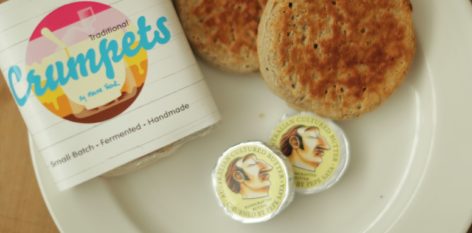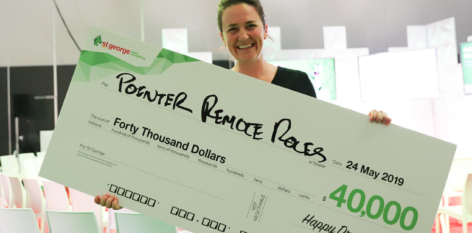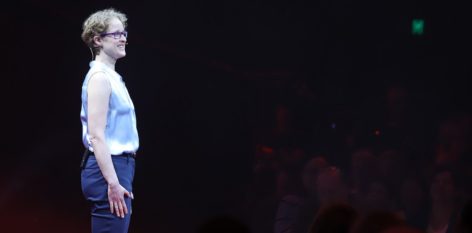Stories are our windows to the past, snapshots of the present, and glimpses into the future. From “Game of Thrones”, “Big Little Lies”, and “Real Housewives” to Gogglebox – good TV storytelling is what’s keeping us on our toes – or on the edges of the sofa! Foxtel’s executive director of television Brian Walsh sat down with TEDxSydney to chat about the Australian TV evergreens, the changing storytelling palettes, and the biggest legacy television content can leave.
TEDxSydney: Ever since the first cave drawings, stories have been exciting, inspiring, and educating humans. How has TV been fundamental in the evolution of visual storytelling?
Brian Walsh: Television continues to be the most impactful of all the mediums in telling visual stories, mostly because of its global reach. Print, theatre, cinema, radio and podcasts are certainly great in telling stories, but only television can deliver images to a global audience in a simultaneous manner. Actually, if we agree that when by saying ‘television’ we mean ‘any kind of video material’, there are millions of screens and devices showing content in all corners of the globe. All the time! No other visual device has that portability and immediacy.
TEDxSydney: What is the most successful Australian TV story of all time?
Brian Walsh: If I had to pick just one story that provides a deep sense of identity to all Australians, I’d choose Kennedy Miller’s prolific series “Vietnam”. Why? As it reflected the changing attitudes of the country at a time when we all questioned the futility of war. It was a breakthrough, even if provocative, TV event that prompted us to investigate our identities and what principles we stood for.
A close second would have to be “Heartbreak High”, the TV series about a Sydney inner-city school. It boldly challenged the typical ‘white Australia’ picture of most TV dramas. In essence, it also proved that – despite some cultural differences – all Australian kids are the same. Then, I cannot omit Play School, everyone’s favourite children’s television program since 1966. So many generations of Australian kids were brought up with the show. Lastly, “Mother & Son” needs a credit too, because it opened the nation-wide debate on aging through the lens of a TV comedy.
TEDxSydney: Every country has a TV personality that challenges the way we think about the world. Anthony Bourdain, for example, was not only a food critic, but also a social geographer and an anthropologist. His legacy was greater than anything on a typical food show. Who would you call the most innovative TV storyteller in Australia?
Brian Walsh: I’d vote for the famous Australian comedy group The Chaser. These guys were fearless! They took on institutions without any concern over political correctness, and were always innovative and unpredictable. Similarly, another comedian Graham Kennedy was just the master of entertainment in his days. He was a brilliant storyteller in a genre that he well and truly owned. There’s never been anyone else like him.
TEDxSydney: TV stories now have to really fight for the viewers’ love, as our attention spans are getting shorter and the entertainment choices are as broad as ever. How can the TV storytelling stay fresh to keep entertaining all generations of viewers?
Brian Walsh: I think that the crucial thing for now is to cut the drama format into a shorter form. With so much choice and the growing audience fragmentation, it is unrealistic to expect that the viewers will tune in to watch a 22-episode season of any series on a weekly basis! People much prefer to binge watch the whole season, thus they will spend 8 to 10 hours maximum on a show. There is no better example of this kind of thinking than “Game Of Thrones”, “Big Little Lies” or Foxtel’s own TV series “Wentworth”.
TEDxSydney: Can you name Foxtel’s most innovative storytelling examples of 2018?
Brian Walsh: “Wentworth” continues to push the boundaries in Australian television drama and has cemented its place as one of the great local series of the past decade. Ever since the first episode in 2013, it’s been ahead of its time, showcasing the brilliant talents of women on both sides of the camera, and showing bold and brave narratives. Similarly, our new local production “Mr In Between” brought a new genre to the screen with an innovative approach to crime drama. Also, the popular reality TV show “Gogglebox” is a great example of an innovative storytelling, as it literally serves as a mirror, reflecting current Australian moods and emotions.
TEDxSydney: What makes for the most engaging TV storytelling in the new media age?
Brian Walsh: For TV drama, I’d say it is a great script. It simply has to be a page-turner, as you need to crave to know “what happens next!” If that kind of script falls into your hands, you know instantly that it’s a potential hit. In any form though, for a hit series to be engaging, the show has to appeal to all four audience quadrants – male, female, young and old viewers. There is no better example of that than “Game Of Thrones”. Then, for the reality television to excite the nation, it has to have a great casting. The success of the shows like “Real Housewives”, “Gogglebox” and this year’s new production “Married At First Sight” all came down to the cast, then the execution and a brilliant postproduction.
TEDxSydney: Can you shed some light on the proudest moments in your TV career?
Brian Walsh: Honestly, I think that’s for others to judge! But being part of the start up team to create Foxtel would have to be amongst my proudest moments. At the same time, the greatest legacy anyone can leave is to mentor next generations. I was fortunate to have people who taught me a lot, and I feel that I owe the next wave of TV creatives the same courtesy.




